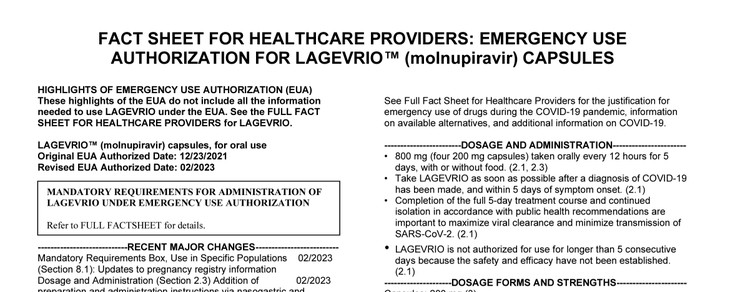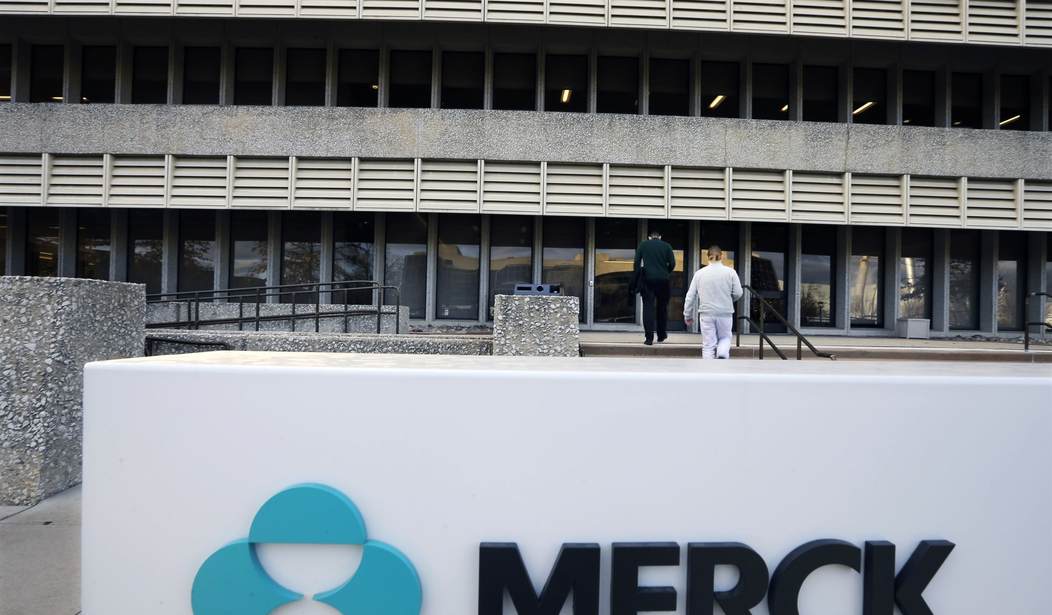I don’t think this is quite the result – nor the publicity – Merck was looking for.
Merck’s Covid pill is giving rise to new mutations of the virus, some of which are already spreading, a new study says https://t.co/UtzeAwVzH7
— Bloomberg (@business) February 1, 2023
The Merck drug molnupiravir (brand name: Lagevrio) was apparently the first COVID oral anti-viral authorized anywhere. Here in the U.S., it received an Emergency Use Authorization (EUA) in December of 2021 that was just renewed this month. It is not – I repeat NOT – FDA approved.

People were clamoring for COVID therapeutics and were pretty damn angry that none had been developed with all the research. The choices were extreme: become so ill one supposedly required intubation (basically a death sentence) or a pre-virus vaccination, with nothing in between. So the scramble to get a pill, any pill, was on.
There were serious concerns voiced about the molnupiravir’s effectiveness and inner workings from the beginning, but those were, well, basically ignored in the headlong rush to get a COVID anti-viral out the door.
…“It’s very clear that viable mutant viruses can survive [molnupiravir treatment] and compete [with existing variants],” says virologist William Haseltine, chair of ACCESS Health International, who has repeatedly raised concerns about the drug. “I think we are courting disaster.” But a Merck spokesperson disputes that the drug has led to the emergence of widely circulating variants, and some researchers downplayed the significance of molnupiravir-caused mutations. “Right now, it’s much ado about nothing,” says Raymond Schinazi, a medicinal chemist at the Emory University School of Medicine, noting that with SARS-CoV-2 infecting millions of people worldwide, the virus is naturally mutating at a fast clip.
…From the start, however, Haseltine and others worried about the drug’s mechanism, which involves introducing so many mutations into the viral genome that it can no longer reproduce. One concern was that the drug might mutate not just the coronavirus, but the DNA of people receiving it—a side effect that has not been seen so far. Another was that mutated virus would survive and propagate—and perhaps turn out to be more transmissible or virulent than before. Before the U.S. Food and Drug Administration authorized the drug, a Merck spokesperson called the worry “an interesting hypothetical concern.”
A big enough concern that more than one renowned scientist was frantically waving big red flags, and pointing out HELLO! The drug doesn’t even work – why are we taking such a risk?
…Some experts immediately flagged the potential for the drug to cause worrying mutations when it first made headlines in late-2021.
Dr Richard Ebright, a molecular biologist at Rutgers University, in New Brunswick, New Jersey, was among those experts – warning against the drug’s use last year.
He told DailyMail.com Thursday: ‘Use of molnupiravir in any nation will contribute to the emergence of new variants of SARS-CoV-2.
‘In view of the poor – essentially zero–efficacy of molnupiravir against SARS-CoV-2, and in view of the high mutagenic activity of molnupiravir and its contribution to the emergence of new variants of SARS-CoV-2, it is disturbing that molnupiravir is being used anywhere, at any time, for the treatment of SARS-CoV-2.’
Dr William Haseltine, known as one of the world’s leading experts in human genome analysis, warned in late 2021 the way the drug worked opened the door to danger.
‘You are putting a drug into circulation that is a potent mutagen at a time when we are deeply concerned about new variants,’ he told Forbes.
He added: ‘I can’t imagine doing anything more dangerous.
‘If I were trying to create a new and more dangerous virus in humans, I would feed a subclinical dose [of molnupiravir] to people infected,’ he continued.
Enter a middle school science and math teacher in the Midwest, whom I guess had a lot of extra time on his hands and is just the sort of guy I want teaching children. He started looking at an international genome database for the telltale markers that molnupiravir would leave if it was, indeed, doing things it shouldn’t. Keep in mind, this drug had, at this point, only been authorized for use for 8 months.
…One virus hunter, Ryan Hisner, a middle school science and math teacher in Monroe, Indiana, started to catalog suspect variants in August 2022 and quickly identified dozens of sequences that showed clusters of those hallmark substitutions. Hisner raised his concerns with researchers on Twitter and ultimately teamed up with Thomas Peacock, a virologist from Imperial College London. With other colleagues, the pair systematically reviewed more than 13 million SARS-CoV-2 sequences in GISAID and analyzed those with clusters of more than 20 mutations. In a preprint posted on 27 January, they report that a large subset showed the hallmark substitutions; all dated from 2022, after molnupiravir began to be widely used.
These signature clusters, the researchers found, were up to 100 times more common in countries where molnupiravir was widely used, including the United States, Australia, and the United Kingdom, than in countries such as France and Canada where it was not. Tracking the dates and locations of the sequences showed some of the mutated strains were spreading in the community. “Clearly something is happening here,” Peacock says.
I’d say that’s a worrying head-scratcher (their paper is here).
The absolutely terrific work these independent guys did is not the only report causing all the sturm und drang. No, that would be a study out of Australia coupled with another from the U.K..
…In one, researchers in Australia found evidence that molnupiravir treatment may be leading to new variants in immunocompromised patients. Because these patients’ immune systems have trouble clearing the virus, viral variants can accrue large numbers of mutations, possibly causing big leaps in viral behavior that can then be passed to others. (Researchers have speculated that Omicron and other SARS-CoV-2 variants evolved naturally in immunocompromised people.) Repeatedly sequencing SARS-CoV-2 genomes from nine patients, five of whom received the drug and four who did not, the researchers found that molnupiravir-treated individuals harbored an average of 30 new variants each within 10 days of the initial dose, far more than the untreated patients.
“Our study demonstrates that this commonly used antiviral can ‘supercharge’ viral evolution in immunocompromised patients, potentially generating new variants and prolonging the pandemic,” the authors wrote in a 22 December 2022 preprint.
Scientists from many institutions are taking notice and speaking up, confirming the concerns are legitimate.
…Jonathan Li, a virologist at Harvard Medical School, told Bloomberg, “There’s always been this underlying concern that it could contribute to a problem generating new variants. … This has largely been hypothetical, but this preprint validates a lot of those concerns.”
…Michael Lin, an antiviral drug researcher at Stanford University, happens to agree.
“There’s no evidence that any of these mutants is worse in any way — not yet — but it’s well agreed that you’re playing with fire if you’re creating random mutations and hoping nothing bad will come of it,” said Lin.
This is what happens when things are rushed, blessed, and shoveled out to states and consumers by the federal government as “safe and effective…probably,” as Jeremy Redfern, deputy press secretary for Florida Gov Ron DeSantis pointed out.
.@IanSams (HHS Public Affairs at the time) basically told Florida to take what we were given for COVID treatments and shut up.@HealthyFla warned @HHSGov about the uselessness of this drug, but it might be even more problematic than expected.https://t.co/tmSCYqYoYy
— Jeremy Redfern (@JeremyRedfernFL) February 2, 2023
So, what’s next for Merck and molnupiravir?
Well, a windfall. China has just approved it to treat the millions of COVID cases they’re dealing with. Terrific, no? As if enough horrible hasn’t happened because of a virus from China. I think the last thing we’d want to do is send something back there that mutates what is already out of control.
Then there’s the Biden administration. Whose FDA on WEDNESDAY removed the positive COVID test requirement to prescribe it here in the U.S. You can get it from your pharmacist now – don’t need a doctor.
CHA-freaking-CHING
The U.S. Food and Drug Administration (FDA) on Wednesday removed the need for a positive test for COVID-19 treatments from Pfizer Inc and Merck & Co Inc.
Pfizer’s Paxlovid and Merck’s Lagevrio pills were given emergency use authorizations in Dec. 2021 for patients with mild-to-moderate COVID who tested positive for the virus, and who were at risk of progressing to severe COVID.
Still, the FDA said the patients should have a current diagnosis of mild-to-moderate COVID infection.
You’ve got to ask – who’s looking out for us here?
I know who’s looking out for Pfizer, Merck, and Big Pharma.
Besides the folks running Florida, I’m not so sure who’s on our side.








Join the conversation as a VIP Member